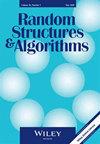翻转过程的突出例子
IF 0.8
3区 数学
Q4 COMPUTER SCIENCE, SOFTWARE ENGINEERING
引用次数: 0
摘要
在[Garbe, Hladký, Šileikis, Skerman:从翻转过程到图形上的动态系统]中介绍的翻转过程是一类随机图过程,它使用一个规则定义,该规则只是从所有固定顺序的标记图到自身的函数。这个过程从一个任意给定顶点的图开始。在每一步中,通过对的随机顶点进行采样,并将诱导图替换为。利用与每个这样的翻转过程相关的图形上的动态系统的形式化,我们研究了几个特定的翻转过程,包括三角形去除翻转过程及其推广,“极端翻转过程”(其中是一个团或一个独立的集合,取决于是否有少于或超过所有潜在边的一半),以及输出不依赖于的“无知翻转过程”。本文章由计算机程序翻译,如有差异,请以英文原文为准。
Prominent examples of flip processes
Abstract Flip processes, introduced in [ Garbe, Hladký, Šileikis, Skerman: From flip processes to dynamical systems on graphons ], are a class of random graph processes defined using a rule which is just a function from all labelled graphs of a fixed order into itself. The process starts with an arbitrary given ‐vertex graph . In each step, the graph is obtained by sampling random vertices of and replacing the induced graph by . Using the formalism of dynamical systems on graphons associated to each such flip process from ibid. we study several specific flip processes, including the triangle removal flip process and its generalizations, ‘extremist flip processes’ (in which is either a clique or an independent set, depending on whether has less or more than half of all potential edges), and ‘ignorant flip processes’ in which the output does not depend on .
求助全文
通过发布文献求助,成功后即可免费获取论文全文。
去求助
来源期刊

Random Structures & Algorithms
数学-计算机:软件工程
CiteScore
2.50
自引率
10.00%
发文量
56
审稿时长
>12 weeks
期刊介绍:
It is the aim of this journal to meet two main objectives: to cover the latest research on discrete random structures, and to present applications of such research to problems in combinatorics and computer science. The goal is to provide a natural home for a significant body of current research, and a useful forum for ideas on future studies in randomness.
Results concerning random graphs, hypergraphs, matroids, trees, mappings, permutations, matrices, sets and orders, as well as stochastic graph processes and networks are presented with particular emphasis on the use of probabilistic methods in combinatorics as developed by Paul Erdõs. The journal focuses on probabilistic algorithms, average case analysis of deterministic algorithms, and applications of probabilistic methods to cryptography, data structures, searching and sorting. The journal also devotes space to such areas of probability theory as percolation, random walks and combinatorial aspects of probability.
 求助内容:
求助内容: 应助结果提醒方式:
应助结果提醒方式:


